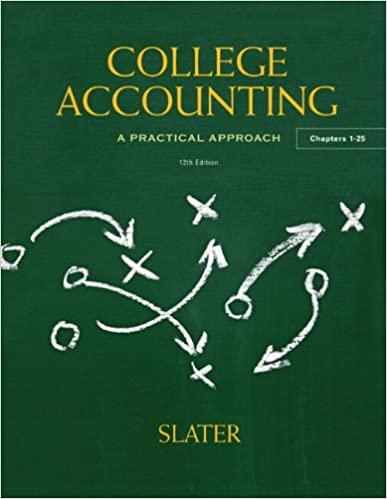You wait and see, Stan told his new sandwich artist Wanda Kurtz. Everything will fall into place
Question:
“You wait and see,” Stan told his new sandwich artist Wanda Kurtz. “Everything will fall into place soon.” Wanda had a tough time serving customers quickly enough, and Stan was in the middle of giving her a pep talk when the phone rang.
“I’ll let the machine pick up,” Stan reassured Wanda, as he proceeded to train her in some crucial POS touch-screen maneuvers.
“Stan!” an urgent voice came over the message machine. “I think you’ve forgotten something!” Stan picked up the phone and said, “Lila, can I get back to you tomorrow? I’m in the middle of an important talk with Wanda.” One of Stan’s strong points as an employer was his ability to focus 100 percent on his employees’ concerns. Yet, Lila simply would not wait.
“Stan,” Lila said impatiently, “you absolutely must get me your worksheet by noon tomorrow so I can close your books. Tomorrow’s the 31st of March and we close on the last day of the month!”
“Ay caramba!” Stan sighed. “Looks like I’m going to be up till the wee hours,”
he confided to Wanda when he put down the phone.
Although Subway company policy doesn’t require a closing every month, closing the books is a key part of their accounting training for all new franchisees. By closing their books, business owners can clearly measure their net profit and loss for each period separate from all other periods. This practice makes activities such as budgeting and comparing performance with similar businesses (or performance over time) possible.
At 9:00 A.M. the next morning, an exhausted Stan opened up the restaurant and e-mailed his worksheet to Lila. He was feeling quite pleased with himself—that is, until he heard Lila’s urgent-sounding voice coming over the message machine 10 minutes later.
“I’ve been over and over this,” said Lila after Stan picked up, “and I can’t get it to balance. I know it’s hard for you to do this during working hours, but I need you to go back over the figures.”
Stan opened up Peachtree and pored over his worksheets. Errors are hard to find when closing the books and, unfortunately, the process doesn’t offer a set way to detect errors or any set place to start. Stan chose payroll because it is one of the largest expenses and because of the new hire.
At 11:45 he called Lila, who sounded both exasperated and relieved to hear from him. “I think I’ve got it! It looks like I messed up on adjusting the Salaries Expense account. I looked at the payroll register and compared the total to the Salaries Payable account. It didn’t match! When I hired Wanda Kurtz on the 26th, I should have increased both the Salaries Expense and the Salaries Payable lines because she has accrued wages.”
“Yes,” said Lila, “Salaries Expense is a debit and Salaries Payable is a credit, and you skipped the payable. Great! With this adjusting entry in the general journal, the worksheet will balance.”
Stan’s sigh of relief turned into a big yawn, and they both laughed. “I guess I just fi nd it easier to hire people and train them than to account for them,” said Stan.
Discussion Questions
1. How would the adjustment be made if Wanda Kurtz received $7.00 per hour and worked 25 additional hours? Where do you place her accrued wages?
2. Stan bought three new Subway aprons and hats for Wanda Smith for $20 each but forgot to post it to the Uniforms account. How much will the closing balance be off? In what way will it be off?
3. Put yourself in Stan’s shoes: What is the value of doing a monthly closing, no matter how much—or little—business you do?
Step by Step Answer:

College Accounting A Practical Approach Chapters 1-25
ISBN: 9780132772068
12th Edition
Authors: Jeffrey Slater





